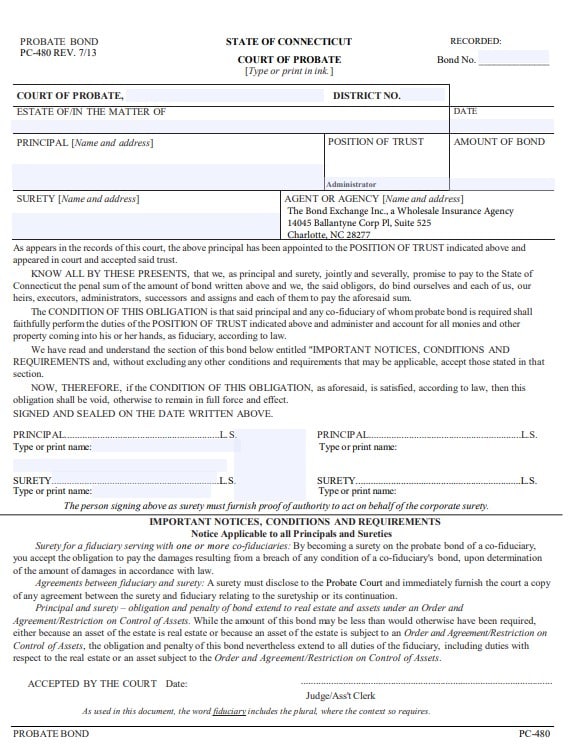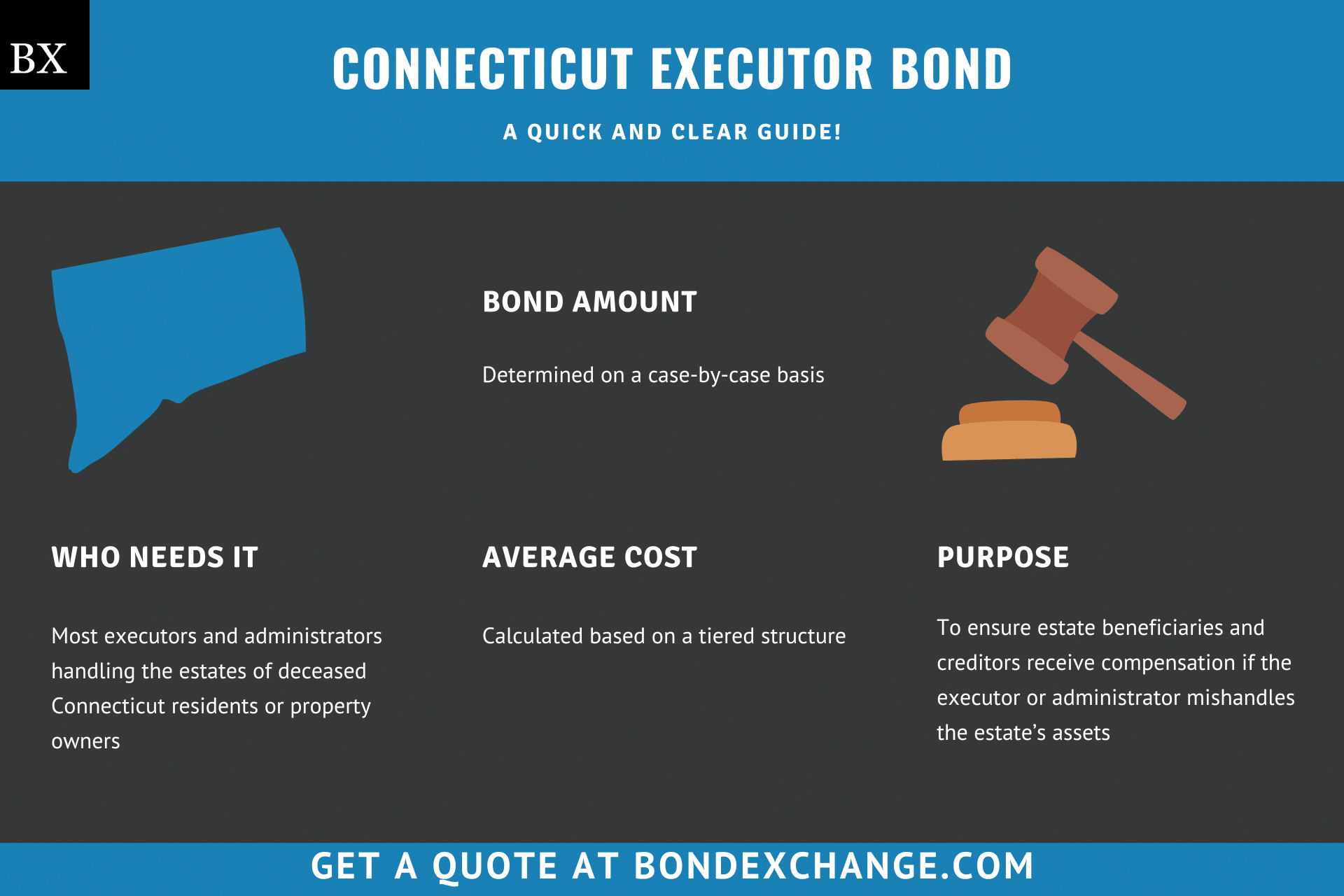Connecticut Executor Bond: A Comprehensive Guide
This guide provides information for insurance agents to help their customers obtain a Connecticut Executor bond.
At a Glance:
- Average Cost: Calculated based on a tiered structure
- Bond Amount: Determined on a case-by-case basis (more on this later)
- Who Needs it: Most executors and administrators handling the estates of deceased Connecticut residents or property owners
- Purpose: To ensure estate beneficiaries and creditors receive compensation if the executor or administrator mishandles the estate’s assets
- Who Regulates Executors and Administrators in Connecticut: The probate court of the district with jurisdiction over where the deceased individual resided or had property

Background
Connecticut Statute Chapter 802b requires all executors and administrators of an estate to be appointed by a court before assuming their fiduciary duties. The Connecticut legislature enacted the appointment requirement to ensure that executors and administrators do not mismanage the estate’s assets. To provide financial security for the enforcement of this requirement, most executors and administrators must purchase a probate surety bond to be eligible for appointment.
What is the Purpose of the Connecticut Executor Bond?
Connecticut requires executors and administrators to purchase a surety bond as a prerequisite to being appointed as a fiduciary over an estate’s assets. The bond ensures that the estate’s beneficiaries and creditors will receive compensation for financial harm if the executor/administrator fails to abide by the regulations outlined in Connecticut Statutes 45a-289 and 45a-290. Specifically, the bond protects beneficiaries and creditors if the executor/administrator mismanages the estate’s assets or fails to submit accurate reports to the probate court. In short, the bond is a type of insurance that protects the estate’s beneficiaries and creditors if the executor or administrator violates their fiduciary duties.
How Can an Insurance Agent Obtain a Connecticut Executor Surety Bond?
BondExchange makes obtaining a Connecticut Executor bond easy. Simply login to your account and use our keyword search to find the “Probate” bond in our database. Don’t have a login? Gain access now and let us help you satisfy your customers’ needs. Our friendly underwriting staff is available by phone (800) 438-1162, email or chat from 7:30 AM to 7:00 PM EST to assist you.
At BondExchange, our 40 years of experience, leading technology, and access to markets ensures that we have the knowledge and resources to provide your clients with fast and friendly service whether obtaining quotes or issuing bonds.
Not an agent? Then let us pair you with one!

Click the above image to find a BX Agent near you
How is the Bond Amount Determined?
Connecticut Statute 45a-289 dictates that the bond amount must be equal to the amount specified in the deceased individual’s will. However, if the amount specified in the will is deemed insufficient to protect creditors and/or ensure the payment of succession taxes, the court may set the bond in an amount equal to twice the value of the deceased individual’s debts or the amount of the tax on any untaxed property plus the succession tax, whichever is greater.
If the bond amount is not specified in the will, the court may set the bond amount as they see fit.
What are the Underwriting Requirements for the Connecticut Executor Bond?
Most surety companies will examine the following factors when determining eligibility for the Connecticut Executor bond:
- Fiduciary’s credit history (not considered for bonds with limits less than $25,000)
- Whether or not the estate has an attorney (not considered for bonds with limits less than $25,000)
- How long the fiduciary appointment is for
- Whether or not the executor/administrator is replacing a prior fiduciary
- If the fiduciary has ever committed a felony
- If there are disputes among the estate’s beneficiaries
- Whether or not there is any ongoing business in the estate
- If the bond is being required by a creditor
How Much Does the Connecticut Executor Bond Cost?
Surety companies typically determine the premium rate for executor bonds based on a tiered structure. As a result, larger bond amounts will be charged a lower premium rate than smaller bonds.
The following table illustrates the pricing structure for the Connecticut Executor bond:
$1,500,000 Executor Bond Cost
| Bond Amount | Premium Rate | Total Bond Cost |
|---|---|---|
| First $20,000 | 0.75% | $150 |
| Next $40,000 | 0.60% | $240 |
| Next $140,000 | 0.50% | $700 |
| Next $300,000 | 0.375% | $1,125 |
| Next $1,000,000 | 0.25% | $2,500 |
| Total cost of $4,715 |
Who is Required to Purchase the Connecticut Executor Bond?
Connecticut requires executors and administrators to purchase a surety bond as a prerequisite to obtaining a fiduciary appointment. To paraphrase the Connecticut Probate Court User Guide, an executor is a person nominated in the deceased individual’s will to administer their estate. Likewise, an administrator is responsible for administering the estate of a deceased individual who either did not nominate them in their will or died without one.
The court may choose to waive the bond requirement in the following instances:
- The will explicitly waives the bond requirement
- The estate is worth less than $20,000 or the amount of the estate not restricted by court order is less than $10,000
- All heirs and beneficiaries agree to waive the bond requirement

How do Executors and Administrators Become Appointed in Connecticut?
Executors and administrators in Connecticut must navigate several steps to become court-appointed fiduciaries. Below are the general guidelines, but applicants should refer to Connecticut’s probate statutes as well as the state’s Probate User Guide for details on the process.
Step 1 – Determine Priority
Priority for appointment as an executor or administrator shall be granted in the following order:
-
- Persons nominated in the will
- The surviving spouse
- Any of the deceased individual’s children of their guardian(s)
- Any of the deceased individual’s grandchildren or their guardian(s)
- The deceased individual’s parents
- Any of the deceased individual’s brothers or sisters
- Any next of kin entitled to a share of the estate
- Any other qualified person
Step 2 – Hire an Attorney
Although not explicitly required, it is highly recommended that executors and administrators hire an attorney to assist with the probate process.
Step 3 – Petition the Probate Court
Persons with priority must petition the probate court of the district with jurisdiction over the estate to obtain their appointment. To do so, executors/administrators should contact the court and a court representative will walk the executor/administrator through the appointment process, provide them with all required forms, and answer any questions they may have. Estates worth less than $40,000, and up to an additional $40,000 in survivorship assets, are eligible for small estate administration, a much simpler probate process.
The court may decide to hold a hearing on the petition, at which time any interested person may voice their concerns or object to the executor/administrator’s appointment.
Step 4 – Purchase a Surety Bond
Unless otherwise exempt, executors and administrators must purchase a surety bond (limits outlined above).
How do Connecticut Executors and Administrators File Their Bonds?
Executors and administrators should submit their completed bond forms, including the power of attorney, to the probate court of the district with jurisdiction over the estate.
The surety bond requires signatures, including witness signatures, from both the surety company that issues the bond and the executor/administrator. The surety company should include the following information on the bond form:
- Court where the bond is to be filed
- Name of the deceased individual
- Legal name and address of the entity/individual(s) buying the bond
- Surety company’s name and address
- Bond amount
- Name, address, and phone number of the insured’s attorney (if applicable)
- Value of the estate’s real estate
- Date the bond is signed
What can Connecticut Executors and Administrators do to Avoid Claims Made Against Their Bonds?
To avoid claims against their bonds, executors and administrators in Connecticut must ensure that they:
- Fulfill their fiduciary duties
- Do not mismanage the estate’s assets
- Deliver an accurate account of the estate’s assets to the probate court
- File accurate reports on the administration of the estate
